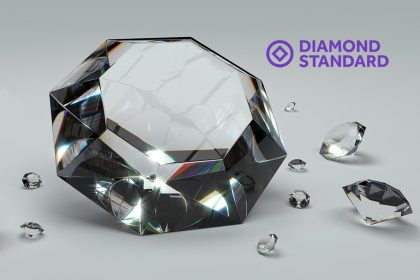Diamond Standard aims to bring standardization and fungibility to diamonds by leveraging the blockchain technology and making them easily tradable like gold.
Many experts in the crypto industry perceive digital currencies to be a store of value just like the gold commodities. Leveraging this viewpoint, a company called Diamond Standard has unveiled a new blockchain-based token backed by real physical diamonds.
When it comes to commodities as a store of value, Diamonds have an advantage over Gold. This is because they are easily portable as well as easy to grade. However, when it comes to standardizing diamonds in the form of exchange, industry players find it often difficult. This is because unlike platinum or gold, each diamond is different with a different price tag.
Diamond Standard aims to solve this industry problem using the blockchain technology combined with a hardware solution. The company sells diamonds in the form of coin-sized discs and credit-card shaped bars. Each Diamond Standard Coin is priced at $10,000 while the Diamond Standard Bar is priced at $100,000.
Cormac Kinney, founder and CEO of Diamond Standard Co, explains how they arrived at this solution. Kinney said:
“We created a diamond commodity by grouping sets of diamonds in a fair and transparent way. The sets are fungible, and the diamonds are independently certified, and the key is that they are sourced through a regulated exchange, with market-driven price discovery.”
Leveraging the Blockchain Technology
Kinney said that standardizing diamond prices can “only became possible with the blockchain, providing a permanent public record for each commodity’s diamond geological contents and provenance, and to enable remote auditing and transactions.”
Just like gold, Kinney wants investors to use diamonds to hedge against other assets. Furthermore, the company notes that the blockchain technology will help diamond owners to remotely audit their possessions in a completely transparent and tamper-proof manner.
The Diamond Standard Coin or the Diamond Standard Bar is basically fungible diamond sets sealed in resin and comprises of military grade wireless encryption chip. This helps to easily verify the commodity sold to a buyer or a custodian. Furthermore, the integrated wireless chip carries the blockchain token called Bitcarbon.
Kinney says that this blockchain token can be easily authenticated as well as remotely audited. “Every aspect of the Diamond Standard commodity is public and can be verified by anyone—in person or on the blockchain,” says Kinney.
The Diamond Standard Exchange is currently seeking regulatory approval from the Bermuda Monetary Authority. Once approved, users can trade the Diamond Standard Coin and Diamond Standard Bar on the exchange platform. Users can hold the commodity themselves or choose a custodian. Custodians hold the commodity in smart cabinets and audit them regularly.
This allows the owner to transact the commodities remotely using the Bitcarbon token. The owner can authenticate the commodity or sell it anywhere in the world just using a smartphone.
Kinney also foresees to bring other traditional investment products to the platform like a diamonds-only exchange-traded fund (ETF).
next
